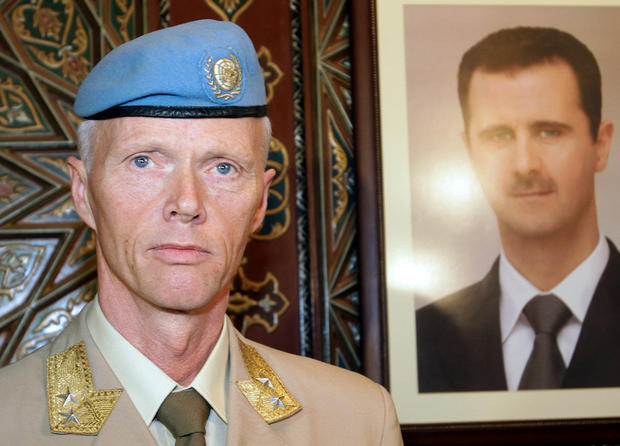Norwegian Gen. arrives to head Syria observers
(CBS News) DAMASCUS, Syria - A veteran Norwegian peacekeeper arrived in Damascus on Sunday to take charge of a U.N. mission monitoring a shaky cease-fire between the Syrian government and protestors, amid growing doubt that the internationally-backed six-point peace plan will end the bloodshed.
Major-General Robert Mood takes over a mission that faces major obstacles before the full 300-member force approved by the U.N. Security Council has even gathered. The unrest has killed more than 9,000 people since March of last year, according to UN figures.
The Local Co-ordination Committees (LCC), an opposition activist network, reported the deaths of 31 people on Saturday, including three children, amid anti-government protests across the country.
Five explosions were heard in Damascus on Friday, with the biggest in al-Midan district, in which a suicide bomber killed 11 people and injured dozens, including civilians and law-enforcement personnel.
A key part of a six-point peace plan laid out by international envoy Kofi Annan involves a cessation of violence by government forces and members of the opposition.
Syrian activists have been dismayed at the pace of the observer's deployment. A senior U.N. official said this week it would take a month to put the first 100 monitors on the ground, though the world body is working to speed up the pace.
The United States is not providing monitors, but is helping with funding and logistics.
Since the official announcement of his appointment, Major-General Mood has not made any comments to the media, but in a recent interview with a Norwegian newspaper he said the mission is "worth making the effort," because "the Syrian people deserve to have an opportunity."
Mood knows Damascus well - he was here to negotiate conditions for an advance team of UN observers, and was head of the U.N. Truce Supervision Organization (which monitors Middle East cease-fires) from 2009 until 2011.
Fifteen monitors have already arrived in the country to prepare the groundwork for the larger mission. Two observers have already been deployed permanently in Homs, two in Hama, two in Idleb, and two in Derra.
Mood faces immediate challenges amid Western doubts about whether the Syrian government will let the monitors work freely.
U.N. Secretary General Ban Ki-moon said on Thursday the Syrian government had not complied with its pledge to the peace plan because it had not withdrawn heavy weapons and troops from cities.
Damascus immediately replied, accusing Ban of encouraging militant attacks by focusing his criticism on the government.
"The international community continues to ignore the crimes committed by the armed gangs and their terrorist acts, and those who stand behind them in what we consider almost like a direct involvement in facilitating and implementing the terrorist plots against Syria," an editorial in the state-run Tishrin newspaper stated Saturday. "We see the example of the Secretary-General of the United Nations recently avoiding any discussion about the violations by these armed groups, while he only focuses in an outrageous manner the Syrian state as usual."
Mass protests against the government of Syrian President Bashar Al-Assad erupted in March 2011, but gradually turned into a military insurgency in response to a regime crackdown. Assad's regime denies it faces a popular uprising, claiming it is being targeted by a foreign-led terrorist conspiracy.
On Friday night the Lebanese Army intercepted three containers of weapons destined for Syrian rebel forces aboard a Syria-bound ship in northern Lebanon. The cargo contained heavy machine guns, shells, rockets, rocket launchers, and other explosives, according to Lebanese officials.
